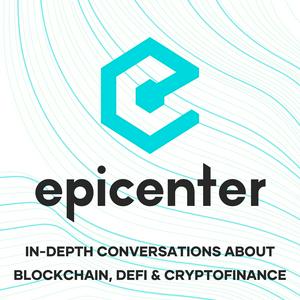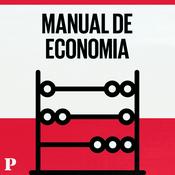Epicenter - Learn about Crypto, Blockchain, Ethereum, Bitcoin and Distributed Technologies
Epicenter Media Ltd.

Último episódio
662 episódios
- In this episode, recorded live at Buidl Europe 2026, host Sebastian Couture leads a panel with Ben Lakoff (Bankless Ventures), Richard Muirhead (Fabric Ventures), Aurora Orellana (G20 Strategies), and Matthew Arrow (Dark Forest). Together, they tackle the existential question facing the industry: can Cypherpunk values like self-custody and permissionless survive as multi-billion dollar institutions become the primary drivers of adoption?
The discussion delves into the tension between individual sovereignty and the regulatory reach of organizations like the FATF, which they describe as a "Goliath" accountable to no one. They explore the concept of the "DeFi Mullet" a centralized user interfaces powered by decentralized backends and how privacy tech is becoming essential not for institutions seeking defensible competitive moats. Finally, the conversation looks at how global competition between jurisdictions will define the next decade of financial freedom and what it truly means to be a Cypherpunk in 2026.
Topics
00:00 Intro & Context
04:15 Cypherpunk Values in an Institutional World
09:30 Permissionless Deployment & Self-Custody
15:00 The Regulatory Spectrum: KYC vs. Freedom
21:45 The FATF & Global Financial Surveillance
27:10 Jurisdictional Competition & Portability
35:20 Selling Privacy to Institutions vs. Individuals
42:15 The DeFi Mullet & Atomic Settlement
49:00 Barriers to Entry: Legacy Mainframes & Career Risk
55:30 What it Means to be a Cypherpunk in 2026
Links
Ben Lakoff on X: https://x.com/benlakoff
Richard Muirhead on X: https://x.com/RichardMuirhead
Matthew Arrow on X: https://x.com/mattarrow
Bankless Ventures: https://bankless.ventures/
Fabric Ventures: https://www.fabric.vc/
Gnosis: https://gnosis.io/
Sponsors: Gnosis: Gnosis has been building core decentralized infrastructure for the Ethereum ecosystem since 2015. With the launch of Gnosis Pay last year, we introduced the world's first Decentralized Payment Network. Start leveraging its power today at http://gnosis.io - In this episode, host Brian Crain is joined by Gracy Chen, CEO of Bitget, to discuss the exchange's rapid ascent and its ambitious roadmap for 2026. Gracy shares her journey from a mathematics background and journalism into the C-suite of a top-tier exchange, detailing Bitget's growth from a team of 150 to over 2,200 employees. She outlines the concept of the "Universal Exchange" (UEX) a unified platform where the boundaries between crypto, tokenized equities, and commodities effectively disappear.
They explore how Bitget is leveraging Generative Engine Optimization (GEO) and AI-driven advisory tools like Get Agent to redefine user acquisition and trading intelligence. Gracy also provides a candid outlook on the "altcoin fading" phenomenon, arguing that the market is shifting toward blue-chip assets and real-world utility. Finally, they discuss the immense challenges of global regulatory compliance, including Bitget’s priorities for securing MiCA licenses and navigating a potential entry into the complex US market.
Topics
- 00:00 Intro & Crypto Beginnings
- 05:45 The Origin of Bitget
- 10:15 The "Universal Exchange" (UEX) Vision
- 16:30 Tokenized Stocks vs. TradFi Brokers
- 22:00 Competition: CEX, DEX, & Robinhood
- 28:15 AI in Trading: Get Agent & GEO
- 34:40 The State of Altcoins in 2026
- 41:00 Global Compliance: MiCA & US Markets
- 55:30 2026 Market Predictions
Links
- Gracy Chen on X: https://x.com/GracyBitget
- Bitget: https://www.bitget.com/
- Bitget Wallet: https://web3.bitget.com/
- Gnosis: https://gnosis.io/
Sponsors: Gnosis: Gnosis has been building core decentralized infrastructure for the Ethereum ecosystem since 2015. With the launch of Gnosis Pay last year, we introduced the world's first Decentralized Payment Network. Start leveraging its power today at http://gnosis.io - In this episode, hosts Sebastien Couture, Brian Crain, and Friederike Ernst gather for their annual wrap-up to discuss the end of the "infinite money glitch": the era where tokens traded at billions without proven product-market fit. They explore the 2025 "spring cleaning" that devastated the altcoin market and the quiet, efficient entry of web2 incumbents like Revolut and Stripe. The discussion centers on the industry's maturation into a space where protocols are finally judged on their ability to generate real revenue and growth.
The team analyzes the 2025 "spring cleaning" of altcoins alongside Polymarket’s mainstream breakout. As giants like Stripe and Revolut scale crypto integrations, the hosts debate if consolidating distribution power is diluting the original promise of decentralized agency. Finally, they address the existential quantum threat to Bitcoin and share their 2026 "hot takes.
Topics
00:00 Intro & Notable Memories
04:30 The Bybit Hack & Price Action
08:15 Polymarket & The Mainstream Breakout
12:00 The Altcoin "Spring Cleaning"
18:45 Axelar & The Circle Acquisition
25:30 Incumbents: Back-end Upgrades vs. Values
33:15 Social Media & The Economics of Attention
42:00 Staking Consolidation & Distribution Power
50:30 The Quantum Threat to Bitcoin
58:45 2026 Predictions: RWAs & Perps
Links
Sebastien on X: https://x.com/seb3point0
Brian on X: https://x.com/crainbf
Friederike on X: https://x.com/tw_tter
Gnosis: https://gnosis.io/
Sponsors: Gnosis: Gnosis has been building core decentralized infrastructure for the Ethereum ecosystem since 2015. With the launch of Gnosis Pay last year, we introduced the world's first Decentralized Payment Network. Start leveraging its power today at http://gnosis.io - In this episode, host Sebastian Couture is joined by Ismael Hishon-Rezaizadeh, CEO of Lagrange, to explore the intersection of frontier cryptography and national security. Ismael discusses the transition of zero-knowledge (ZK) technology from a "token-centric" crypto tool to a vital component of defense, specifically focusing on its role in securing autonomous drone swarms and closing the hypersonic missile gap.
They delve into Deep Proof, Lagrange's ZK-machine learning library, which facilitates verifiable AI execution while protecting sensitive model intellectual property and private input data. Ismael introduces the concept of "Accountable Autonomy," arguing that cryptographic proofs are necessary to ensure that lethal "kill chain" decisions are made by the correct models under verified inputs, removing the risks inherent in "black box" AI decision-making. Finally, the conversation touches on the geopolitical competition with China, the importance of domestic chip manufacturing, and why the US market's ability to align private sector innovation with military needs is a decisive strategic advantage.
Topics
00:00 Intro & Context
04:15 ZKML vs. Venice
09:30 Protecting Model IP
15:00 Dual-Use Defense Pivot
21:45 The Palantir Comparison
27:10 US-China Chip Race
35:20 Drone Swarm Consensus
42:15 Accountable Autonomy Explained
49:00 Kill Chain Verifiability
55:30 EU vs. US Defense
Links
Ismael on X: https://x.com/Ismael_H_R
Lagrange Labs: https://www.lagrange.dev/
Anduril Industries: https://www.anduril.com/
Gnosis: https://gnosis.io/
Sponsors: Gnosis: Gnosis has been building core decentralized infrastructure for the Ethereum ecosystem since 2015. With the launch of Gnosis Pay last year, we introduced the world's first Decentralized Payment Network. Start leveraging its power today at http://gnosis.io - Fresh off the launch of the Ignition Chain and a successful community-led $61M token sale, Aztec Network co-founder Zac Williamson joins Friederike Ernst to unpack the "existential" journey of building programmable privacy. Zac opens up about the "sacrificial altar" moment where the team decided to kill their live product, Aztec Connect which had 60k users because they realized true decentralized privacy required rebuilding from scratch rather than iterative upgrades.
They dive deep into the architecture of the new network, which utilizes a hybrid state model (encrypted UTXOs for privacy, public accounts for transparency) to enable composable applications. Zac challenges the cryptographic dogma of "don't roll your own crypto," arguing that for pioneers, relying on "battle-tested" libraries is impossible. He explains why decentralized sequencers are not just a moral choice but a security necessity to prevent government-mandated backdoors.
Finally, Zac contrasts the chaotic but decentralized resistance to surveillance in the US with the increasing top-down control in the UK and Europe, framing Aztec as essential "defense in depth" for the digital age.
Topics
00:00 Intro
03:45 The "Sacrificial Altar": Killing Aztec Connect
10:15 Hybrid Architecture: UTXOs vs. Accounts
16:30 Why You Must "Roll Your Own Crypto"
22:00 Decentralization as a Defense Against Backdoors
28:15 Performance: Throughput & Latency Trade-offs
34:40 Private Smart Contracts: Gaming & Identity
41:00 The Macro View: US vs. EU Surveillance
Links
Gnosis: https://gnosis.io/
Zac Williamson on X: https://twitter.com/Zac_Aztec
Aztec Network: https://aztec.network
Noir Language: https://noir-lang.org
Sponsors: Gnosis: Gnosis has been building core decentralized infrastructure for the Ethereum ecosystem since 2015. With the launch of Gnosis Pay last year, we introduced the world's first Decentralized Payment Network. Start leveraging its power today at http://gnosis.io
Mais podcasts de Negócios
Podcasts em tendência em Negócios
Sobre Epicenter - Learn about Crypto, Blockchain, Ethereum, Bitcoin and Distributed Technologies
Epicenter brings you in-depth conversations about the technical, economic and social implications of cryptocurrencies and blockchain technologies. Every week, we interview business leaders, engineers academics and entrepreneurs, and bring you a diverse spectrum of opinions and points of view.
Epicenter is hosted by Sebastien Couture, Brian Fabian Crain, Friederike Ernst, Meher Roy and Felix Lutsch. Since 2014, our episodes have been downloaded over 8 million times.
Sítio Web de podcastOuve Epicenter - Learn about Crypto, Blockchain, Ethereum, Bitcoin and Distributed Technologies, The Diary Of A CEO with Steven Bartlett e muitos outros podcasts de todo o mundo com a aplicação radio.pt

Obtenha a aplicação gratuita radio.pt
- Guardar rádios e podcasts favoritos
- Transmissão via Wi-Fi ou Bluetooth
- Carplay & Android Audo compatìvel
- E ainda mais funções
Obtenha a aplicação gratuita radio.pt
- Guardar rádios e podcasts favoritos
- Transmissão via Wi-Fi ou Bluetooth
- Carplay & Android Audo compatìvel
- E ainda mais funções


Epicenter - Learn about Crypto, Blockchain, Ethereum, Bitcoin and Distributed Technologies
Leia o código,
descarregue a aplicação,
ouça.
descarregue a aplicação,
ouça.

































